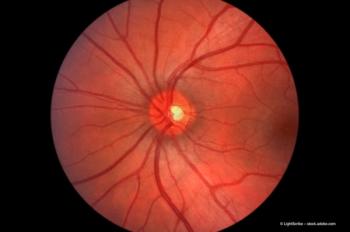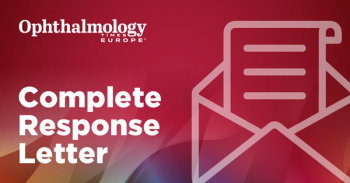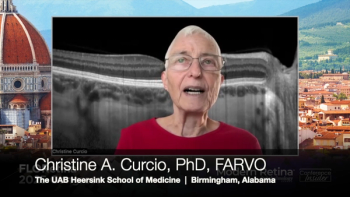
Is microplasmin the future for a range of retinal disorders?
Positive pooled results from the MIVI-TRUST phase III programme are a sign that a microplasmin one-off injection will be a real alternative to surgery
Microplasmin is a molecule created from plasminogen, just one of the substances involved in blood clotting and the natural management of blood clots. Similar protein formations are also seen linking the vitreous to the retina in the eye, which, as biopharmaceutical developer, ThromboGenics saw means that microplasmin has the potential to be used in the treatment of a number of important ophthalmic indications.
Subsequently, ThromboGenics developed microplasmin as a non-surgical treatment for focal vitreomacular adhesion, a condition in which the vitreous gel has an abnormally strong adhesion to the retina. Over time, the gel tends to pull forward and can cause vessel and retinal distortion causing decreased vision. Microplasmin, as a proteolytic enzyme, has the potential to facilitate and in some cases replace vitrectomy and induce posterior vitreous detachment (PVD) by breaking down the protein structures, which join the vitreous to the retina. Consequently, ThromboGenics sees microplasmin as having the potential to treat diabetic retinopathy and AMD, particularly in those patients where vitreomacular adhesion may play an important role in their condition.
The MIVI-TRUST programme (Microplasmin for IntraVitreous Injection-Traction Release without Surgical Treatment) is the largest interventional clinical programme ever performed to specifically evaluate the vitreoretinal interface in patients with retinal disorders, recruiting 652 patients at 90 centres in Europe and the US.
Results
Of the 465 microplasmin treated patients 26.4% achieved resolution of their vitreomacular adhesion at 28 days, compared with 10.2% of the 182 patients who received a placebo injection. This was statistically highly significant with a p value of 0.000002.
Patients without epiretinal membrane saw microplasmin perform even better with 37.4% of 270 patients achieving VMA resolution without surgery at 28 days, compared with 14.3% of 119 placebo treated patients (p = 0.000003).
For those 106 patients with full thickness macular hole (FTMH) 40.6% saw closure of their FTMH at 28 days following a singe 125 µg injection of microplasmin, without needing a vitrectomy. That compared with 10.6% of 47 patients in the placebo group (p = 0.00015). Closure of the FTMH led to the microplasmin patients experiencing what ThromboGenics describes as a significant improvement in their visual acuity (VA) compared to baseline.
The pooled results were presented by Professor Peter Stalmans (Leuven University Hospitals in Belgium) at the EURETINA Congress in Paris and he gave an analysis of the pooled VA data from the Phase III programme. At the end of the 6 month study period, 23.7% of the microplasmin treated patients had achieved at least a 10 letter (2 lines) improvement in VA without the need for vitrectomy, That compared to only 11.2% of the patient group who received the placebo injection (p = 0.0002). Of the microplasim treated population 9.7% of patients achieved a 15 letter (3 lines) improvement in their VA without the need for vitrectomy, compared to 3.7% of the placebo patients (p = 0.01). The microplasim treated patients also showed an improved Quality of Life when compared to placebo, based on the VFQ-25 (US National Eye Institute Visual Functioning Questionnaire) results.
Professor Stalmans said: "I am delighted to have presented these pooled results for the first time. Based on these exciting Phase III results and my own personal experience, I have little doubt that microplasim will quickly become an important treatment option for patients with a range of retinal disorders, including macular hole. The benefits of this simple one-off injection are very appealing, when compared to surgery, to both patients and retina specialists."
Chief executive officer of ThromboGenics, Dr Patrik De Haes, said: "The successful completion and reporting of our 652 patient Phase III programme with microplasmin in just 20 months demonstrates ThromboGenics's highly effective drug development capabilities. The pooled data presented clearly show that microplasmin could make a significant difference to the treatment of vitreoretinal disorders. The results from these pivotal trials will form the central part of the packages that we plan to submit to the FDA and EMA by mid 2011 to support our applications for marketing approval. Given the success of the overall Phase III clinical programme and our plans to market microplasmin ourselves both in the US and Europe, we are now gearing up our pre-markteing activities and our commercial organization. Based on these exciting results and our discussions with many leading retinal specialists, I am convinced that microplasmin has the potential to become a highly attractive treatment option for a broad range of retinal disorders."
Newsletter
Get the essential updates shaping the future of pharma manufacturing and compliance—subscribe today to Pharmaceutical Technology and never miss a breakthrough.




























